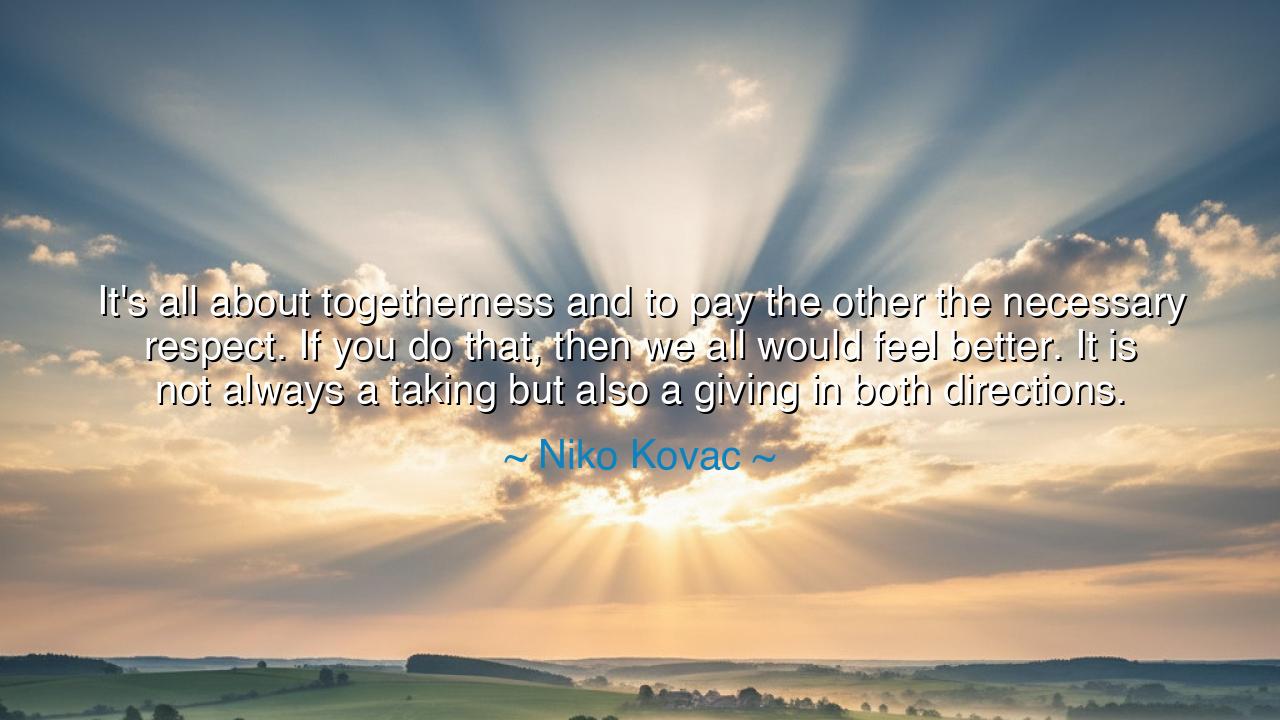
It's all about togetherness and to pay the other the necessary
It's all about togetherness and to pay the other the necessary respect. If you do that, then we all would feel better. It is not always a taking but also a giving in both directions.






The words of Niko Kovač—“It's all about togetherness and to pay the other the necessary respect. If you do that, then we all would feel better. It is not always a taking but also a giving in both directions”—are simple in sound yet profound in spirit. They are the kind of truth that does not shout but endures. In these few lines, Kovač, a man forged in the discipline of sport and leadership, speaks not merely of teamwork but of the ancient law of harmony—the understanding that life is sustained not by dominance or self-interest, but by mutual respect and the eternal balance between giving and receiving. This is not a lesson for the field alone, but for every realm where human hearts must learn to move as one.
In the time of the ancients, philosophers spoke of the Golden Mean, a path between excess and deficiency, where virtue lives in balance. So too does Kovač remind us that in relationships—whether between friends, teammates, or nations—balance is sacred. A world built only on taking becomes hollow; a world built only on giving without recognition becomes weary. True togetherness is born when both acts exist in harmony, when the hand that receives is also the hand that gives. This rhythm, this back-and-forth of respect, is the heartbeat of civilization itself.
History offers us endless mirrors of this truth. Consider the tale of Marcus Aurelius, the philosopher-king of Rome. Surrounded by legions and power, he could have ruled with arrogance. Yet in his Meditations, he wrote constantly of humility, of duty to others, of gratitude to those who taught him. He understood that a leader’s greatness is measured not by how much he commands, but by how deeply he listens. He led as one who knew that respect is the foundation of strength, and that no empire can stand long if its people forget to honor one another’s humanity. Kovač’s wisdom echoes that same spirit—the warrior’s humility.
In his life as a footballer and coach, Niko Kovač witnessed both triumph and defeat, unity and discord. The game, at its highest level, becomes a mirror of life itself: egos clash, alliances form, and victory demands not only skill but spirit. To hold a team together, one must learn to balance pride with patience, to honor each person’s role, from star striker to kit manager. When he speaks of giving in both directions, he reminds us that success in any endeavor—whether in sport, art, or family—depends on the quiet exchanges of respect that happen beyond the spotlight. The passing of the ball is only a symbol; the real exchange is invisible, made of trust.
There is a story from ancient Japan, of a master swordsman and his student. The student asked, “Sensei, what makes a true warrior?” The master replied, “A true warrior bows first, even to his enemy.” The student was puzzled. The master continued, “Because when you bow, you acknowledge that the other is human too. You remind yourself that this battle is not about destruction, but understanding.” This bow, this gesture of respect, is the same essence that Kovač speaks of—the acknowledgment that every being we meet is worthy of dignity. Without such gestures, even victory becomes barren.
The wisdom of giving and taking applies far beyond sports or warfare. In love, it is the breath that keeps relationships alive. In communities, it is the bridge that joins strangers into neighbors. In nations, it is the thread that holds peace together. When one side only demands, the bond decays; when both sides honor the flow of giving and receiving, harmony flourishes. It is an ancient truth found in every culture—from the yin and yang of the East to the teachings of Christ, who said, “It is more blessed to give than to receive.” Yet as Kovač reminds us, it is most blessed when both are done with respect.
The lesson of this quote is both moral and practical: no person thrives in isolation, and no relationship—whether in business, friendship, or family—can survive without mutual regard. To the young, this may sound gentle, but it is the foundation of every strong civilization. The world will always test your patience, your pride, your sense of fairness. In those moments, remember that respect is not weakness—it is wisdom, and togetherness is not conformity—it is strength.
So, my child, when you walk among others, do not seek only to gain. Seek to give. Speak not only to be heard, but to understand. Pay each person the necessary respect, and you will find that life itself softens before you. Like a well-played game where every pass returns, like a song where every note finds its answer, the harmony of giving and taking will make not only you stronger, but the world gentler. And in that balance, we all will indeed feel better.






AAdministratorAdministrator
Welcome, honored guests. Please leave a comment, we will respond soon